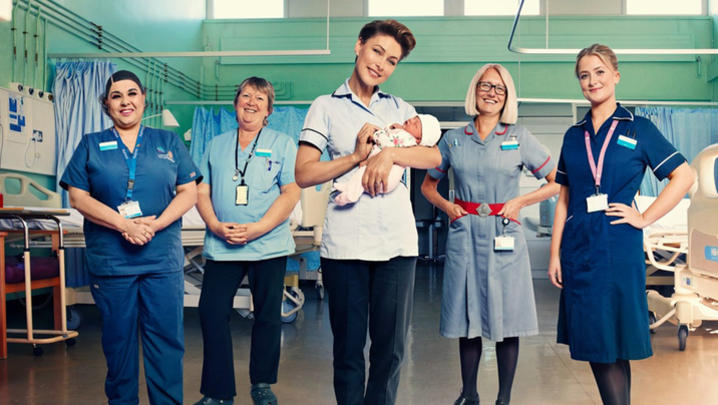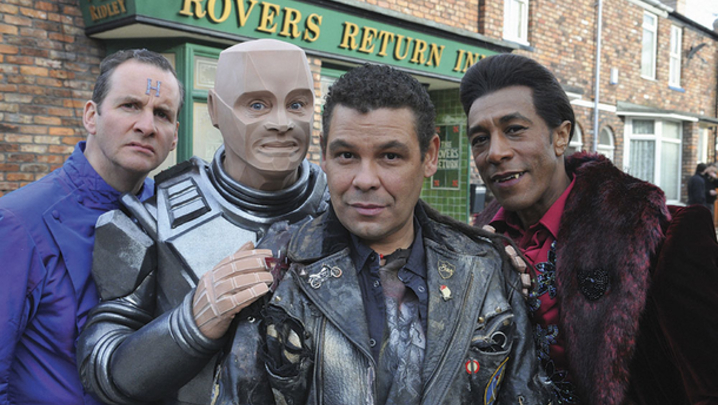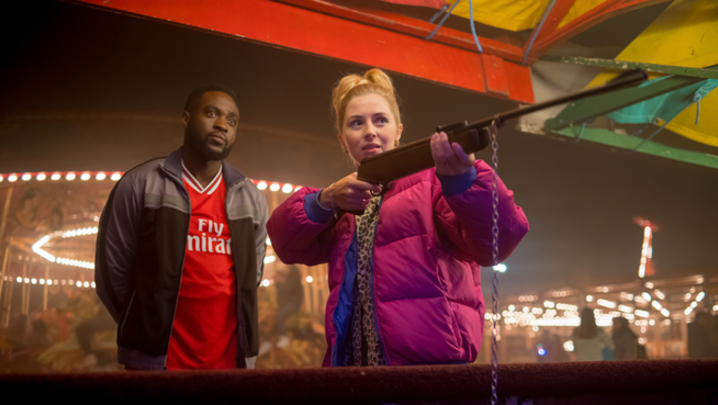CEO Marcus Arthur aims to grow the company internationally now that it is fully owned by BBC Studios. Steve Clarke reports.
Marcus Arthur may be a BBC veteran, but the winds of change blowing through UKTV these past nine months or so have been like no other in his lengthy BBC career.
Last June, he succeeded Darren Childs as the outfit’s CEO. His appointment followed the end of the joint venture with Discovery, which finally gave BBC Studios full control of UKTV and its seven-channel portfolio (its three lifestyle channels were acquired by Discovery as part of the separation) and the online hub, UKTV Play.
The line-up comprises pay-channels Gold, W, Alibi and Eden, plus free-to-air services Dave, Drama and Yesterday.
UKTV – formed originally as a partnership between BBC Worldwide and Thames Television – has consistently punched above its weight against US-backed competitors. This is thanks to its exclusive, first-look deal with the BBC, which gives it secondary linear-TV and catch-up rights to everything from Line of Duty and Top Gear to, last but hardly least, Dad’s Army. Throw in all of Gavin & Stacey and Fawlty Towers and it’s not hard to see why UKTV has been so resilient for so long.
Childs’ regime saw the group move confidently into commissioning original shows, latterly scoring with Dad’s Army: The Lost Episodes, the glossy PR drama Flack and, of course, Taskmaster.
Now, UKTV has reached what Arthur recently described as “a watershed moment” and he is weighing up the next phase of its development.
Arthur was born and bred in Glasgow, one of six brothers and sisters. His father was a firefighter, his mother a secretary. He read psychology at the University of Glasgow, followed by an MBA.
His first job was selling advertising for BBC Magazines. A defining time was working at Radio Times, where he was publishing director for four years. Next year, he will celebrate 30 years at the Beeb.
Prior to taking over the top job at UKTV, he ran BBC Studios’ UK region, a job that involved running 10 businesses ranging across magazines, DVDs, live events, audio and clips. He was also responsible for Studios’ Australian business, which includes six pay-TV channels – all “hugely profitable”, he notes.
It was here that he gained the experience that qualified him to run UKTV, whose board he has been on for six years. “I knew the business reasonably well from the outside before I came in,” says Arthur with a degree of self-effacement.
On Childs’ watch, a period spanning eight years, revenues at UKTV grew by 68%, while the portfolio’s share of commercial viewing increased by 42%.
The new CEO is under no illusions that he can repeat this: today’s market is considerably more competitive. “Over that period, UKTV’s content costs doubled. The ambition to grow channels and launch new things was fully invested in by both of the shareholders,” he recalls. “That was an opportunity for massive growth. There is less obvious opportunity now, but there will be stuff there.”
Before the split from Discovery, he says the company was “almost landlocked” in its ability to make decisions. “It was a UK-only business and that’s how it looked at its future, bought its rights and bought its content slate,” he explains. “UKTV almost completes the set for BBC Studios, because it has production, content distribution and origination and relationships with indies – but what it never had was a large channel portfolio outside the BBC that it could run its content through.”
Arthur, a convivial man who seems to burst with energy, stresses that, in its latest iteration, UKTV can commission shows that can make a splash in international markets and even launch some of its channels and brands outside of the UK.
He cites the example of crime thriller Traces, the acclaimed drama commissioned for Alibi, starring Martin Compston. It was the channel’s first original scripted show and its ratings success took UKTV by surprise.
In the past, this show would have been “very difficult” for UKTV to afford. Now, explains Arthur, thanks to BBC Studios’ distribution deal, money that previously might have gone to Discovery or a third-party distributor “stays in the family”.
He emphasises: “Having Studios as an owner should allow us to be more universal in some of the content we are commissioning and making.”
While acknowledging a “macro threat” of the US streamers as competition for people’s viewing time, he insists that the arrival of BritBox and the extension of BBC iPlayer’s typical window to a year are unlikely to damage his business.
“We’re a linear-channels business – strong channel brands and strong channels. That’s the way we market and sell. We make our money through two models: pay and, more than anything, advertising.
“For me, there’s still clear water between that business model and BritBox charging you £5.99 a month.”
"At some point, all your children leave home. We put blood, sweat and tears into that programme (Taskmaster)"
The original commissions and an unexpected surge in young viewers helped UKTV recover from 2018’s five-year low: the company recorded a 4% growth in commercial share across its portfolio last year, despite being demoted on EPGs.
The broadcaster reported a 7.76% share of commercial impacts in 2019, up from the previous year’s 7.48%. His ambition is to get this up to 9%. “If we achieved that, we’d be the second biggest channels group again. There are people who are bigger than us, but we can compete with them because we’ve got great content,” says Arthur.
UKTV commissions accounted for seven of its top-10 performers in 2019, including Gold’s The Cockfields and Dad’s Army: The Lost Episodes, Dave’s Taskmaster, W’s Emma Willis: Delivering Babies and Alibi’s Traces. Dave helped grow the portfolio’s share of 16- to 34-year-olds by 14% (up from a 5% to a 5.76% share of audience). UKTV claims that Dave is the number-one non-PSB channel for this demographic.
If this sounds like it has all been plain sailing with Arthur at the helm, think again. In November, Channel 4 announced that it had snapped up the company’s most successful original show, Taskmaster.
Reports suggested that staff at UKTV were “heartbroken” by the loss of the flagship series. Arthur puts it like this: “At some point, all your children leave home. We put blood, sweat and tears into that programme. Originally, they went to Channel 4 with it. It didn’t work with them, so they came to us.
“We put that show on the map and invested huge amounts of marketing money to grow it. It got to the place where the renegotiation was such that we couldn’t hold on to it.”
Typically upbeat, Arthur highlights the opportunity to invest in new shows now that the budget for Taskmaster is freed up.
The priorities are drama, comedy and factual entertainment. Also likely are more partnerships between UKTV and the BBC’s main channels of the kind that saw Expedition with Steve Backshall launch as a four-episode BBC Two series before a further six parts broadcast on Dave.
And don’t be surprised if the present seven-channel line-up starts to grow again. Arthur hints: “We haven’t got a definitive plan, but we will be looking at every opportunity.”






